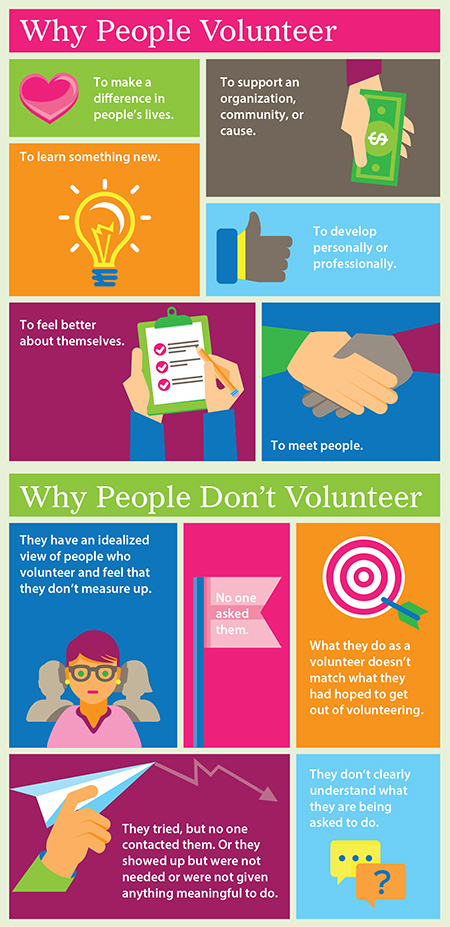Why Don’t People Volunteer?

The real reasons people don’t help, and what you can do about it.
You’ve made announcements and phone calls. You’ve hung flyers and sent notes home. When the same familiar faces answer your pleas for volunteers, it’s natural to wonder why other people aren’t showing up. Your regular volunteers make helping out a high priority. Why doesn’t everyone else?
Many researchers have investigated the motivations behind volunteerism. These studies help explain why people volunteer and why they don’t, as well as how to encourage more participation by even the most reluctant moms and dads. Understanding motivation is the key to successful recruitment and retention of volunteers.
It’s Personal
First, recognize why people volunteer. Researchers agree on six motivators. People volunteer to make a difference in others’ lives; to support an organization, community, or cause; to learn something new; to develop personally or professionally; to feel better about themselves; and to meet people.
Join the PTO Today community (it's free) for access to resources, giveaways and more
Understandably, parent group leaders tend to focus on the first two reasons when they reach out. Their messages usually emphasize what volunteers can do for the school and its students rather than what participation can do for the volunteer: Help with the carnival so the children can have fun. Sell these items so the school can purchase new computers. Your efforts will make a difference for our school.
But the truth is that many motivations are personal. So while parents do want to support the PTO and improve the school experience for their children, they often are also seeking to grow or connect in some way. They want to develop new skills, enhance self-esteem, and expand their social network.
“Because we have this view of what volunteering means—that it’s all about giving to others—it takes away from how we could more effectively recruit and retain volunteers,” says Allen Omoto, a psychology professor at Claremont Graduate University in Claremont, Calif., whose research focuses on the social and psychological aspects of volunteerism.
To encourage parents to get involved, publicize what’s in it for them. “Don’t just advertise that ‘We need people’ or ‘You should be giving back,’” Omoto says. Better messages include “You can meet friends like you” and “You’ll get to know your child’s teachers.”
One study that focused on different reasons for volunteering ran ads in a college campus newspaper. Some of the ads seeking participants said that volunteering was a good way to help the community. Some said that volunteering was a good way to learn about oneself and develop skills. And some just said that volunteers were needed. The ads that focused on motivation were more effective in drawing people than the ads that didn’t. And when the volunteers were interviewed later, their goals matched the ad that inspired them to volunteer. Thus, the study concluded, different messages will reach different volunteers, and an appeal to why someone might want to volunteer is better than just stating what the volunteer will be doing.
So how can you put this into practice? As you assess your volunteer needs at the start of the school year, consider how to publicize these needs in ways that might match individuals’ goals. Need someone to help decide on the games for the spring festival? This could provide volunteers with a chance to gain experience in event planning. Need a person to log fundraising income into a database? Maybe that’s an opportunity for someone to practice basic functions in Excel. Need someone to become a room parent? That volunteer will get to meet the other parents in her child’s class.
Once people volunteer, ask what they’re hoping to gain and then match their tasks to their motivations. For instance, if someone has stepped forward with an interest in meeting people, have that person mentor a new family rather than sort labels at home. And it’s helpful if volunteers periodically reflect on what they want to get out of the experience since motivations can change over time. In those cases, assignments should also evolve or the volunteers are more likely to quit.

Why People Don’t Volunteer
In addition to understanding why people do volunteer, it’s important to examine why they don’t. One reason is that they feel like they don’t measure up to other volunteers, about whom they may have an idealized view. “Sometimes people look at volunteers and see them as being somehow more noble or moral than they themselves are,” Omoto says. In contrast, that nonvolunteer might think, “That’s a higher calling than I have. I’m not really that way. I’m just worried about getting to my job and taking my kids to school.” To debunk this stereotype, parent groups might use their newsletters to highlight working people—including men—who help out as they can rather than the volunteers who are able to spend hours a day at the school.
Another reason for hesitance is that no one asked the person to get involved. “Of all the research I’ve seen, across all age groups, the number one reason people volunteer is because they’re asked,” says Sarah Jane Rehnborg, a professor of public affairs in volunteerism and board governance at the University of Texas at Austin. “A single person directly asks a single other person—that’s really, really important. When you ask everybody—when you send a flyer home saying ‘We need help with X’—you’re essentially asking nobody. Some will come forward, but a lot will think ‘I’m too busy’ or ‘They don’t need me’ or ‘Someone else will come forward.’”
Research by Walter Wymer, a management professor who studies volunteerism at the University of Lethbridge in Alberta, Canada, cites a U.S. study by Gallup which concludes that people are more than four times as likely to volunteer when they’re asked as when they’re not. Wymer also found that people are more likely to volunteer if they know someone in the organization because that connection lessens the perceived “social risk” people feel when joining a new group. So use current volunteers to reach out to those parents they know and to cultivate connections with those they don’t.
Another cause for reluctance is that potential volunteers don’t clearly understand what they are being asked to do. “People don’t volunteer because it takes too much work to find out what it’s all about,” says Susan Ellis, president of Philadelphia-based Energize Inc., an international training, consulting, and publishing firm specializing in volunteerism. “Break it down into things people can picture, and they are more likely to respond.” She suggests precisely describing the task and the time commitment, such as sitting at a table from 4 to 6 p.m. to check in volunteers for the carnival or writing up the minutes after each month’s PTO meeting.
Encouraging Volunteerism
If people do volunteer, be sure to contact them and give them something to do, preferably an activity that matches their interests and expertise. In research published in 2010, Louis Penner, a social psychologist at the Karmanos Cancer Institute in Detroit, Mich., states that “the worst personnel mistake a charity can make is to have no tasks for a new recruit to do.” The harder people work as volunteers, the more likely they are to continue. Still, you don’t want to overwhelm uncertain new volunteers with too much responsibility right away, or they’ll flee. It’s a delicate balance. The use of an experienced mentor to guide newbies is one way to get people involved while giving them a reasonable workload.
Experts offer these additional ways to encourage volunteerism:
Identify an individual (school staff or parent volunteer) who can guide volunteers.
Involve their children in volunteers’ activities.
Begin with an open mind about what volunteers can do and how they can do it. Offer periodic volunteer activities for those with limited time. Offer virtual volunteer work for those who can’t volunteer in person. Reach out beyond parents for volunteers, including seniors, youth, and people with disabilities. Recruit a bilingual parent to work with parents who don’t speak English.
Make it easy for people to be involved by offering support such as childcare, meals, and opportunities at different times on different days.
Recognize that some parents have likely had negative educational experiences and need to feel comfortable before they will volunteer. Engage them first by encouraging their attendance at social events.
When people quit volunteering, don’t make them feel guilty. If their experience was positive, they may return when their schedules permit.
What’s most important in building a team of parent volunteers is to recognize that there are many reasons to get involved. As an active volunteer yourself, you already know the many benefits of participation. Tap into the personal motivations of other parents. Publicize how much people can gain from joining in, and your parent group will grow and thrive.






















